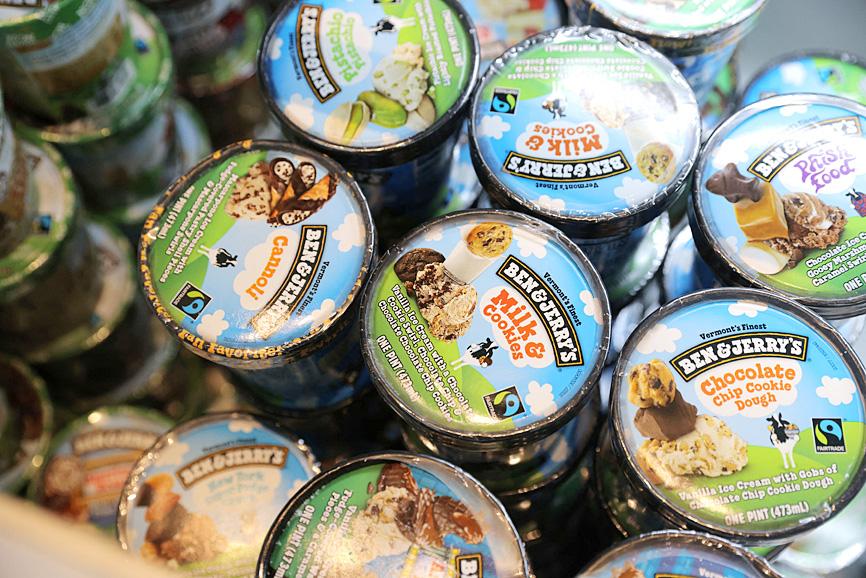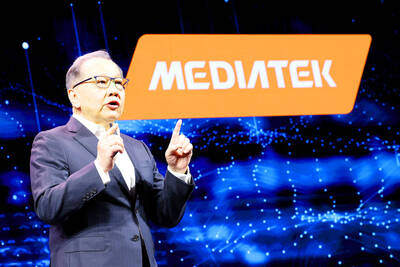Unilever PLC’s sales report showed that most shoppers are willing to pay more for products like Dove soap and Axe deodorant, but the company warned that might change as the war in Ukraine exacerbates raw material inflation.
First-quarter sales growth was 7.3 percent on an underlying basis, Unilever said yesterday, with full-year sales growth at the top end of its 4.5 to 6.5 percent forecast.
However, Unilever said that profitability would probably be at the bottom end of its forecast range this year, as shoppers start to balk at new price increases.

Photo: Reuters
Unilever is one of the few major European consumer goods companies that have been reporting a decline in shipments, even though the drop was less than expected in the first quarter.
Nestle SA has said it does not yet see signs of shoppers switching to cheaper products.
“There is more to do as we navigate our business through unprecedented cost inflation, but we are making good progress,” chief executive officer Alan Jope said in the statement.
Unilever boosted pricing almost 13 percent on homecare products, which include Omo detergent and Domestos cleaners, resulting in a 2.9 percent drop in volume.
The maker of Ben & Jerry’s ice cream and Dove soap earlier this year said that it was facing the worst inflation since the financial crisis and that it would take two years for the company to return to last year’s profitability level.
“It’s extremely hard to predict where we end up” on inflation in the near term, chief financial officer Graeme Pitkethly said on a call with reporters.
“We still expect to restore our margins in 2023 and 2024, but we’re seeing about 6 billion euros [US$6.3 billion] of costs increases since last year and that’s quite extraordinary for us,” he added.
Unilever expects raw material cost inflation of 2.7 billion euros in the second half, up from 2.1 billion euros in the first half.

Taiwanese suppliers to Taiwan Semiconductor Manufacturing Co. (TSMC, 台積電) are expected to follow the contract chipmaker’s step to invest in the US, but their relocation may be seven to eight years away, Minister of Economic Affairs J.W. Kuo (郭智輝) said yesterday. When asked by opposition Chinese Nationalist Party (KMT) Legislator Niu Hsu-ting (牛煦庭) in the legislature about growing concerns that TSMC’s huge investments in the US will prompt its suppliers to follow suit, Kuo said based on the chipmaker’s current limited production volume, it is unlikely to lead its supply chain to go there for now. “Unless TSMC completes its planned six

Intel Corp has named Tasha Chuang (莊蓓瑜) to lead Intel Taiwan in a bid to reinforce relations between the company and its Taiwanese partners. The appointment of Chuang as general manager for Intel Taiwan takes effect on Thursday, the firm said in a statement yesterday. Chuang is to lead her team in Taiwan to pursue product development and sales growth in an effort to reinforce the company’s ties with its partners and clients, Intel said. Chuang was previously in charge of managing Intel’s ties with leading Taiwanese PC brand Asustek Computer Inc (華碩), which included helping Asustek strengthen its global businesses, the company

Power supply and electronic components maker Delta Electronics Inc (台達電) yesterday said second-quarter revenue is expected to surpass the first quarter, which rose 30 percent year-on-year to NT$118.92 billion (US$3.71 billion). Revenue this quarter is likely to grow, as US clients have front-loaded orders ahead of US President Donald Trump’s planned tariffs on Taiwanese goods, Delta chairman Ping Cheng (鄭平) said at an earnings conference in Taipei, referring to the 90-day pause in tariff implementation Trump announced on April 9. While situations in the third and fourth quarters remain unclear, “We will not halt our long-term deployments and do not plan to

NOT OVERLY PESSIMISTIC: While consumer electronics demand remains volatile, MediaTek CEO Rick Tsai said that tariffs would have limited effect on the company Chip designer MediaTek Inc (聯發科) yesterday said revenue this quarter would contract by 4 percent sequentially in the worst-case scenario on softer smartphone demand. Revenue is expected to be between NT$147.2 billion and NT$159.4 billion (US$4.6 billion-US$4.98 billion), compared with NT$153.31 billion last quarter, the company said. MediaTek said demand for smartphone chips would be flat or slide sequentially this quarter, while demand for smart devices and power chips would go up. Mobile phone chips made up 56 percent of the company’s total revenue last quarter. Gross margin of 46 to 49 percent is forecast for this quarter, compared with 48.1 percent last